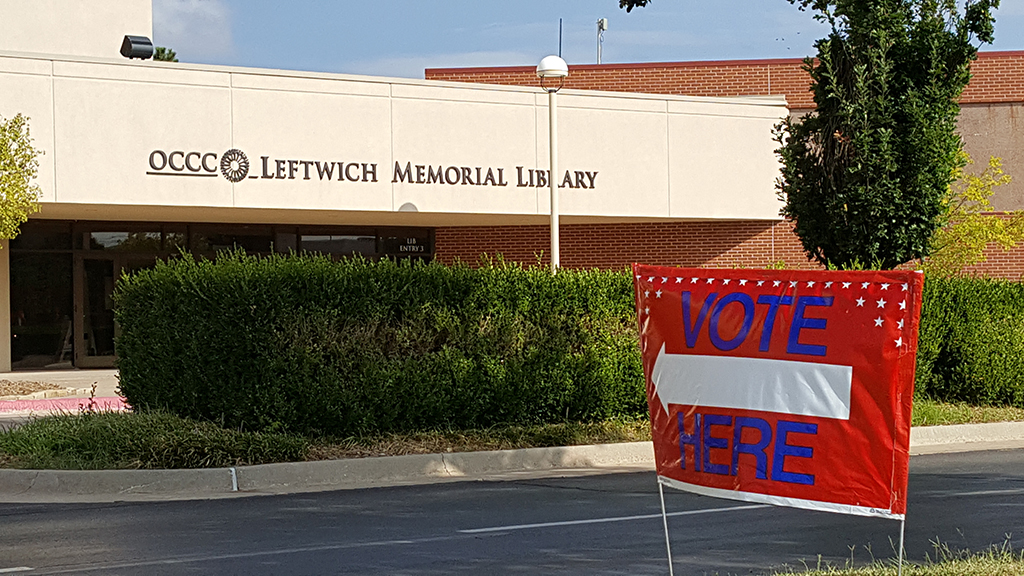State Will Supply Limited Info to Feds

Oklahoman voter information will be given to the President Donald Trump’s task force before the July 14th deadline, the Pioneer has confirmed.
Vice Chairman Kris Kobach, a member of the Presidential Advisory Commission on Election Integrity, sent a letter requesting voter information from all 50 states submit information on voters.
The task force was created in May by a Presidential Executive order.
Kobach’s letter asked for detailed voter information. “I am requesting that you provide to the Commission the publicly available voter roll out data for Oklahoma, including, if publicly available under the laws of your state, the full first, and last names of all registrants, middle names,” Kobach said, “or initials if available, addresses, dates of birth, political party, last four digits of social security number.”
Officials with the Oklahoma State Election Board said that they provide Social Security numbers to the task force, but would provide Oklahoma’s voter roll, which is a public document under the state’s Open Records Act.
Bryan Dean, a spokesman for the Oklahoma State Election Board, said the state is required by law to release any information that is open to public record.
“In Oklahoma we have the Oklahoma Open Records Act which covers what’s public record under Oklahoma law, and unless there’s a specific exemption, records are open,” Dean said. “That requires a government to release information to anyone who requests it.”
Dean says voter lists would be considered public records, and that it’s not unusual for that information to be requested.
“The request specifically asks for [information], and one of the things it lists are for the last four of [the voter’s] social security numbers,” he said. “Full, and partial social security numbers aren’t publicly available under the laws of our state, so that’s not in our voter list.”
Dean also said that the State Election Board would send the task force a link to their website where the information could be downloaded.
However, many Oklahomans remain concerned by the request.
Daryl Gandy, a political science teacher at U.S. Grant High School, said the information requested is public information, but was concerned how that information would be used.
“I do believe it is an overreach of the federal government to even ask for that information, and could eventually lead to a 10th amendment violation if [the government] isn’t careful,” he said.
The 10th Amendment to the U.S. Constitution says the powers not given to the federal government are left to the states, and its people.
“Voting regulations are done by a state-by-state basis,” Gandy said. “So if the feds were to use that data to try to install federal voting regulations, it would violate the 10th Amendment.”
Oklahoma City Community College student Keshawn Jackson said he tried to avoid politics altogether and said he doesn’t understand the president’s intentions.
“I don’t understand why he wants all of that information,” Jackson said. “I mean hopefully it’s for the greater good. Then I don’t mind, but if it’s for anything positive to benefit the people then I’m for it.”
He said that if Trump is doing the requests for his own benefit then he said “go for it.”
“As long as it’s not affecting us in a bad way in Oklahoma, then making things too complicated, but that’s him; that’s how Donald Trump does things,” he said.
Jesus Silva, an OCCC Finance Economics major, said if the president was wanting to prove illegal immigrants voted, he may come up short.
“I don’t support Trump, and I didn’t support Hillary,” Silva said. “I don’t think that illegal immigrants are going to go to the place where people vote.”
Silva said he doubts an undocumented person would go somewhere with the fear of being deported.
“If he gets the information he will find that illegal people are not voting,” he said.
Dean, the election board spokesman, said his agency views the task force’s request as though it were another person asking for the information.
“People think that voter history includes how they vote, we have no idea how they vote, and we don’t have that information,” Dean said.
Overall, 44 states have denied the Voter Information Request, and voters think it is unnecessary to ask for information already available to the public.
“The questions asked in the beginning [of the request] are reasonable,” said Christina Owen, a congressional candidate. “Asking for feedback on what can be improved, and some basic stats on convicted voter fraud are valid inquiries.”
However, Owen said she believes that when the task force requested information that is not available to the public, there is a reason for concern.
“They do specify what is public record which many of these aspects are not public record such as social security, and felony status,” she said.
Owen wrote that she also doesn’t believe public records would show whether or not someone is registered in other states, their military status, or if voters used an overseas absentee ballot.
“Since the other information they are requesting is public knowledge they could just research and compile the data themselves,” she said. “[Gathering records] would be an expense on the state to compile this information into a customized database for the federal government, and to what end?”
Owens wrote that to gather this much data would be a waste of time, and could cost the state money. “Voter Fraud is such a low priority it speaks to his leadership style that he even brings it up at all,” she wrote. “If he wanted to improve secure voting, and increase registration he should look at a federal online system to roll out to states.”
Owen said it’s strange that President Trump chose to focus on a small issue like voter fraud whenever North Korea now has the capability to bomb Alaska, “and trade relations with China has become abysmal.”
“I would think he would have bigger priorities than collecting public records from states,” she said.